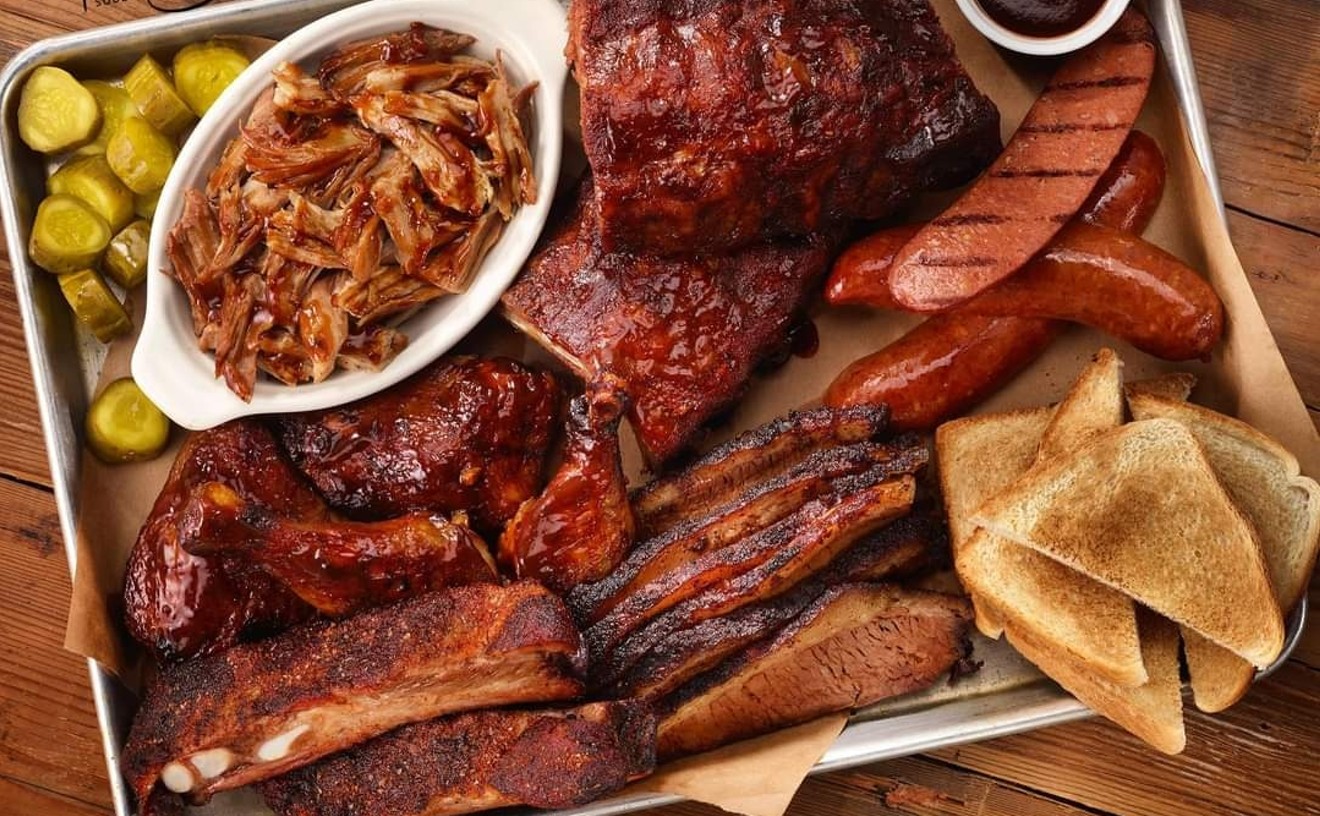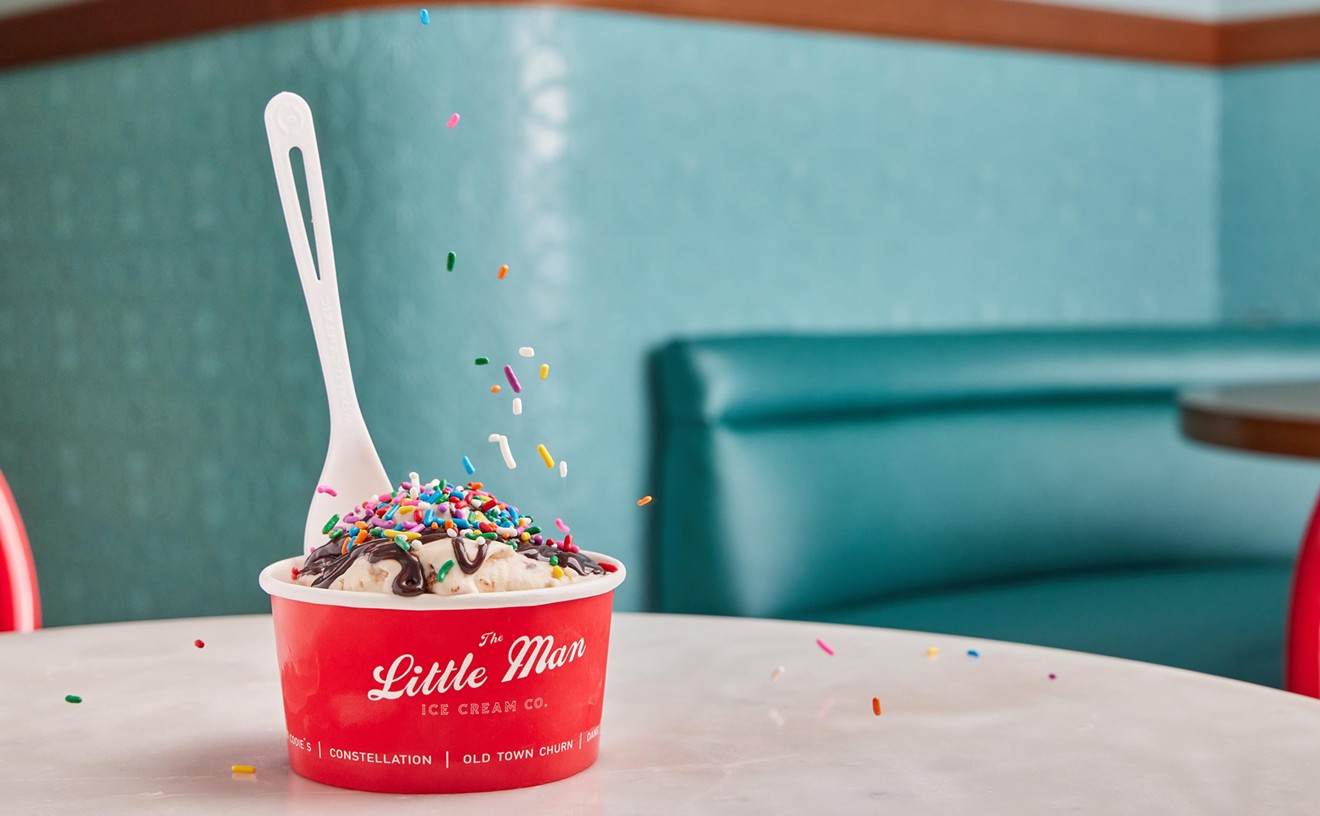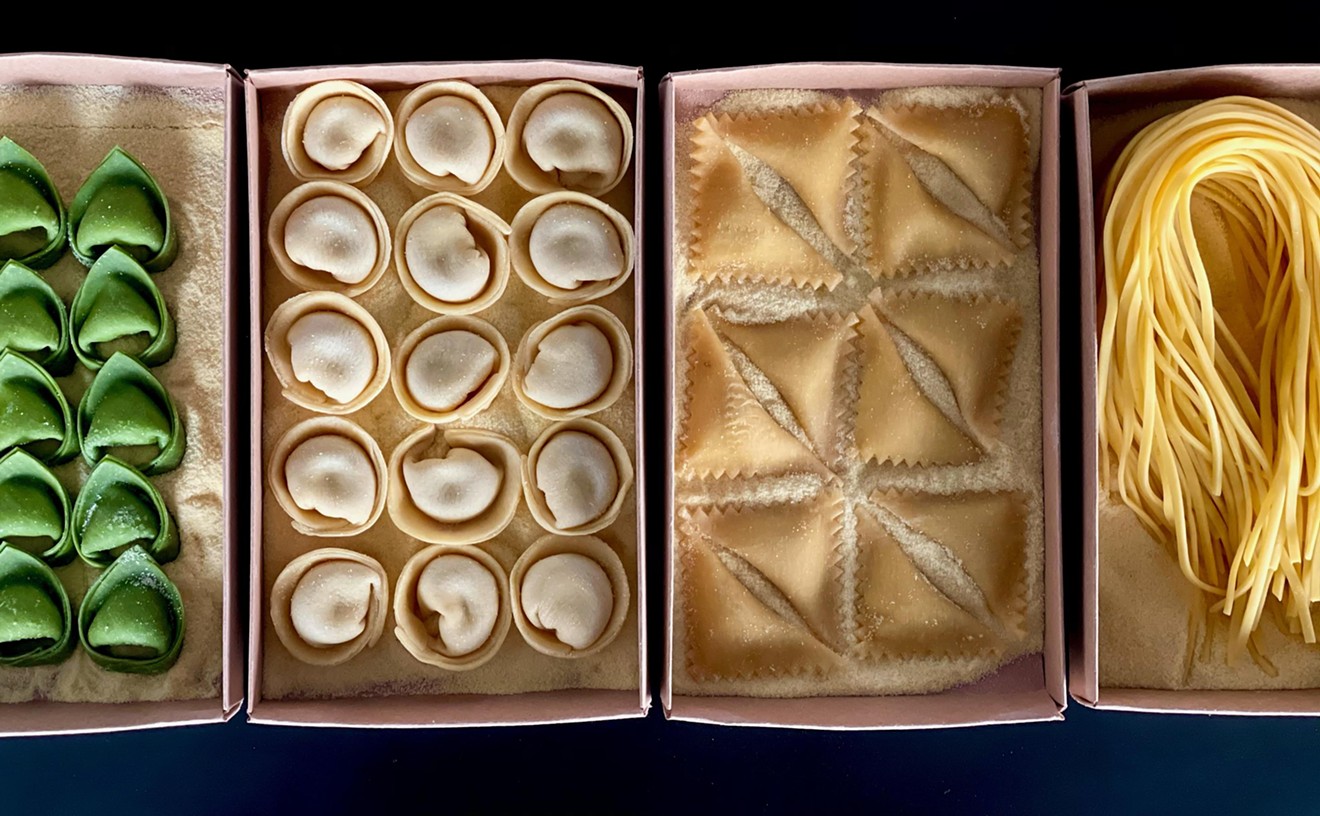It's the third chicken-fried steak I've eaten in less than 24 hours. I have the meat sweats. My heart is pumping sausage gravy. I feel like I might die. And I hope they're right, these girls. I hope God's boy is as nice as they say -- as forgiving as advertised -- because an argument could certainly be made for my having done this to myself. The sin of gluttony has always been the one that's tripped me up. I'm not a killer. I'm not a thief. I covet like a motherfucker, but I always feel badly about it afterward. I make no graven images (provided you don't count my occasional Richard Dreyfuss-in-Close Encounters impressions, giving Laura the crazy eye and sculpting mounds of mashed potatoes into a likeness of Devil's Tower). But gluttony? Yeah, I'm screwed.
Still, if there is a heaven (a theory on which I remain stubbornly unconvinced), and if, as some philosophers have opined, heaven is a personal construct of the soul's desire for peace, and if said construct is truly unique to the individual, then my heaven -- that eternal hangout for my immortal whatsis -- will look a lot like Davies Chuck Wagon Diner. Forget the clouds and harps, and never mind the communion with the Almighty. Just give me vinyl seats and lots of chrome, clean ashtrays and some pie. Let the Baptists, the Catholics and their ilk slug it out over matters angelic. All I care about is Friday-night meatloaf and chicken-fried steak on Sundays.
Marc Cohn once said that if there's a God in heaven, He drives a silver Thunderbird. What Marc left out was where God was headed. I'm pretty sure it was Davies. Maybe not directly, but He was surely on His way.
It's early, and the dining room at Davies is still in the clutch of a post-holiday breakfast rush. Most of the booths and tables are full, as are all of the stools at the counter, and the kitchen -- a bunker at the center of the floor, square and cramped and built like a Nazi pillbox overlooking the Omaha beachhead of the front door through a narrow slit -- is roaring with activity. The air is close, humid with bodies, heavy with smoke and the sounds of frying oil, pans hitting burners, plates hitting stainless, and dozens of conversations.
There are scuffs on the tile floor (white, spotted with custom pieces showing cowboys and injuns in the classically tacky Old West style: Frederic Remington on acid) and stains on the walls, tar and grease and nicotine, like a slow sepia-toning of the world inside. The building seems to breathe -- taking in drafts of cool air from outside, exhaling customers -- and nothing is ever still. Tables turn fast. Coffeepots make the rounds.
When I'd ordered my chicken-fried steak and coffee and toast, I'd set the timer. Even with a full house, the toast and coffee had come in about a minute, the chicken-fried steak, eggs and hashbrowns in just over six. In twice that time, I've barely made a dent. The steak is nearly an inch thick, milk-soaked and tender enough (after having been beaten into pudding with a mallet) to be cut with a cheap tin fork. It's jacketed in crisp breading, topped with an amorphous blob of scratch-made white gravy (just flour, butter, cream, pepper and probably sausage grease) that's pure white death, and it crowds to the edge of the plate two eggs over so easy that the yolks broke just because I looked at them funny.
Behind me, the girls talk about Jesus. A waitress sits down at my table, sighing, puffing out her cheeks without looking at me, resting her legs. Then she smiles, asks if there's anything else she can get me, holds her pad poised just in case. I say no, thanks. She calls me "hon" and from somewhere in the ether, the Muzak pulls down a scratchy version of Elvis singing "Hard Headed Woman." That would make everything perfect except that the last song in the rotation was Night Ranger or Mister Mister or worse -- both dating from years when Davies was in operation, but not the period I care about.
Davies Chuck Wagon was built in 1957, maybe one of the best years for diners, definitely one of the last. It's a Mountain View, constructed in Singac, New Jersey, and the name is appropriate, because from the sidewalk out front (if you lean a little and look west), you can see the foothills rising over a hump in the land. It's doubly appropriate, in fact, because of all the diners bolted together on those grimy East Coast assembly lines, all the Valentines and Belaires and Indian Chiefs, Mountain View #516 traveled the farthest. Brought by train at the height of the boom and settled delicately onto a foundation laid on West Colfax, no other East Coast diner made it as far as this one did.
And few have lasted as long. Estimates peg the ultimate output of the Jersey (and New York and Massachusetts) diner-construction companies at around 10,000 units. There were discount models that were more lunch stands than proper diners -- just six stools, a counter and a flat grill -- and deluxe versions sporting everything from inlaid neon and coffin freezers to pulsing Ming the Merciless spires. These diners went everywhere. Every small town seemed to have one, back in the day when wheat-field crossroads and Midwestern Greyhound stations pulsed like hot, bright UFOs in the night, like landed motherships calling out to the faithful, ready to return them to the planet Formica.
But today, a good count puts the number of surviving (not operating, just surviving) vintage diners at around 3,000. Davies is one. It's listed on the National Historic Register and myriad websites that catalogue diner art and diner food and diner neon and diner signage like the gigantic cowboy at Davies, which was erected right about the time the Chuck Wagon was opening for business. The diner has outlasted several owners and has been in the possession of Dwayne Clark for decades. The patio out front is newer, but the inside is more or less original: a piece of American history as honest as a burger and fries, as real as heartburn, as strange as a fever dream at six in the morning when the sun is still struggling to rise and the recovering nighthawks crowd the counter. In the light, there's something magic about a place that wears its past so well, that knows the names of all its regulars, that has outlived so many of them and gathered their stories into the collective memory. And at night, when everything has gone dark, there's something almost gothic about that same place, like ghosts in the chrome and an ache for the untouchable that's gone missing over the years.
Across town, Rosie's Diner services a mostly transitory clientele, making serious bank on the tourist trade flowing in from the hotels that surround it and on the campy replication of a history that it does not necessarily own. At a distance, Rosie's is just another one of those awful, '50s-style nostalgia joints, a giant, shining, diner-shaped pimple tucked in a parking lot behind an Applebee's with a view of nothing but strip mall. It's a spot I'd driven by a hundred times without ever once thinking of stopping. I'd guessed it was a chain. I'd imagined waitresses in poodle skirts and a burger called "The Big Bopper" served without even a trace of irony.
And, as is so often the case, I was wrong. Well, mostly wrong. True, this Rosie's technically has no history. It is all of five years old, and was one of two Rosie's opened in Colorado and soon acquired by Great American Restaurant Properties -- a parent company that operates the Bennett's Bar-B-Que franchise. But Rosie's was inspired by a Rosie's diner in New Jersey that dates from the '40s, and, like Davies, was built in Jersey (Oakland, New Jersey, to be specific) -- by Paramount Modular Concepts, a company that custom-makes modern diners -- and shipped whole to Aurora in much the same way that Davies made the long trip west by rail fifty years ago. What's more, it was recently sold to an independent owner, Genessee Elinoff, who thought she could make a go of it without corporate support.
And from the looks of things, she can. Rosie's is slammed during the breakfast and dinner rushes. It hosts cruise-in nights for classic-car cultists on Wednesdays, opening up the parking lot to a generation of restored 'Vettes and Fairlanes. It serves colossal portions of food for prices so low I can't quite figure out how it makes any money. The floor staff all wear Hawaiian shirts (which is only slightly better than poodle skirts), serve a fantastic malted milkshake, and warm the syrup for the pancakes -- a courtesy that, in the pantheon of customer service, I consider to be just below free blow jobs for regulars in terms of making a fella feel special.
The kitchen here makes great french fries, awful macaroni and cheese that tastes like cold noodles in Cheez Whiz, an excellent pot roast and a loose, almost silky meatloaf that it throws down in huge slabs on Texas toast for a great sandwich that seriously rivals the best meatloaf sandwiches I've had anywhere outside my own kitchen. And it, too, does chicken-fried steak -- for breakfast, lunch and dinner -- and does it well. The steaks are a bit thinner than those at Davies, but you get two of them stacked one on top of the other, which more than makes up for the difference in weight. The gravy at Davies is thick and sticky and homemade. The gravy at Rosie's is thick and sticky and studded with shreds of sausage; it's such an idealized version of a truck-stop white that I want to believe it comes from some centralized sausage-gravy production facility, shipped out once a month in a tanker truck and pumped into tanks hidden on the roof. But it's actually made every day in Rosie's kitchen, just like the pancake batter and the pot roast and the pie.
Still, because I am grumpy, because I am a purist, because I hate fakery and facade and reproduction anything and loathe the co-opting and recycling of history to make a buck, I feel a little dirty each time I sit down here, either at the long counter or in a booth beneath the framed still of James Cagney with his wild hair and pistols in his hands. I want to hate Rosie's for its gleaming chrome and smooth tabletops, for its polished floors and put-on airs -- the same way I will instinctively distrust a person whose house is too clean or whose suit cost more than my car. At Rosie's, the two stools at the far end of the counter -- useless because they're set in front of a service station -- are labeled as "Reserved" for Elvis and Marilyn, which I find unconscionably cheesy. At Davies, there have been times when I wouldn't have been surprised to see the real Elvis or Marilyn wander in -- or at least some sad, doe-eyed modern version in blue suede shoes or brushed angora, paying for coffee and toast with Indian-head nickels and crumpled dollar bills.
When I stop by Rosie's for a breakfast of chicken-fried steak, gravy, French toast and coffee with Laura, I am sullen and unpleasant, ticking off in my head all the things I dislike (the lithographed Hollywood posters, the mounted Elvis singles on the walls, the non-smoking signs displayed so naggingly on the door, walls and counter, and the reproduction tabletop mini-jukes that actually work, as opposed to the authentic Seeburg Wall-o-Matics at Davies, which do not) while stealing bites of Laura's perfectly cooked ham steak and pancakes with warmed syrup. She tells me my reasons for hating Rosie's are stupid and childish. Worse, they're hypocritical, because I love (for example) American cafes that go out of their way to model themselves after the French originals. The only difference, she points out, is that I've never been to Paris, whereas I have obviously spent far too much of my life already haunting the booths of joints like Davies.
I go back for dinner (chicken-fried steak again) and really look at Rosie's to see if Laura is right. I mean, what's not to love? It's clean and well-lit, independently owned and successful. The staff is friendly, the shakes and malts and meatloaf are great, the kitchen's pot roast tastes better than my mom's pot roast ever did, and the cooks are giving the cuisine they've chosen its due: making their own gravy and mashed potatoes the old-fashioned way, not cheating and using potatoes from a box. Three people can eat breakfast here for under twenty bucks (pre-tip) and have leftovers to take home. And over the course of three meals, I've seen the waitresses hug no fewer than five customers (none of them me), which means that Rosie's must have regulars comfortable enough with the help to be hugged by them.
But Rosie's is and always will be a fake, a mockup based on a model no longer in production. It's a good fake and artfully done, but it still bothers me that places like Rosie's are changing the history that places like Davies created. A real diner is not clean or convenient. It's not bright or well-designed or campy. Real diners are small, cramped, smoky, loud and alive in a way that no sterile revisionism can ever truly capture. Looking at Rosie's is like an exercise in cultural steganography -- trying to find some picture of true Americana hidden in the backscatter radiation of pop art and recycled fads, Hollywood stills, Elvis on the radio and muscle cars in the lot. Rosie's has charm like an unlined face, like a kid with a bootblack mustache trying to fit into his dad's shoes. But Davies has the history -- the one thing the pretenders can't buy, can't build and can't ever fake.
Which, of course, is how I ended up having my third chicken-fried steak in 24 hours at Davies Chuck Wagon, how I ended up thinking about heaven and Richard Dreyfuss and silver Thunderbirds. There just aren't many spots like Davies left, not many spots that look like this, that smell like this, that leave you crushed right up against life like this. Behind me, the Jesus girls are packing up. The waitress presses back against the dull silver wall to let them pass. There's already another party waiting for their table, and more at the door. I cut another bite of my chicken-fried steak and shove it into my mouth just because I can, and because if it does kill me, at least I won't have far to go to get to heaven.










